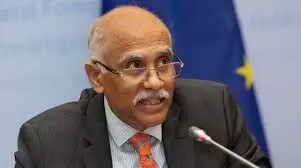India Slams Pakistan at UN Over Terror Sponsorship, Cites 20,000 Indian Lives Lost

India has strongly criticized Pakistan for spreading false information about the Indus Waters Treaty (IWT), which New Delhi suspended following the deadly terrorist attack in Jammu and Kashmir’s Pahalgam on April 22.
Speaking at the United Nations, India’s Permanent Representative, Ambassador Parvathaneni Harish, made it clear that the 65-year-old treaty will remain on hold until Pakistan ends its support for cross-border terrorism. He referred to Pakistan as the “global epicentre of terror” and said India could not continue cooperation under such conditions.
Harish’s remarks came after a Pakistani representative raised the issue at the UN, claiming that “water is life and not a weapon of war.” India suspended the treaty on April 23—just a day after the attack in Pahalgam killed 26 people. Investigations into the incident revealed links to terror groups across the border.
“India has always acted responsibly as an upper riparian state,” Harish said, while pointing to four key reasons behind India’s decision to suspend the treaty.
He reminded the UN that India had signed the Indus Waters Treaty in 1960 in a spirit of friendship, but Pakistan had repeatedly betrayed that goodwill. “In the last six and a half decades, Pakistan has waged three wars and orchestrated thousands of terror attacks against us,” he said. “More than 20,000 Indians have lost their lives in terrorist attacks over the past 40 years, including the recent tragedy in Pahalgam.”
Despite this, Harish noted, India had shown “extraordinary patience and magnanimity” in upholding the treaty for so long. “Pakistan’s state-sponsored cross-border terrorism threatens civilian lives, religious harmony, and economic growth in India,” he added.
He also pointed out how the world has changed since 1960. Today, India faces growing energy needs, the urgent challenge of climate change, and demographic shifts—all of which demand better use of its water resources.
At the same time, advances in dam technology have made it possible to build safer, more efficient infrastructure. But Harish said Pakistan has consistently blocked any efforts to modernize old dams or update treaty provisions, even when those changes are allowed under the treaty. “Pakistan’s obstruction puts lives and infrastructure at risk,” he said.
Over the past two years, India has repeatedly asked Pakistan to sit down and discuss updates to the treaty, but those requests have been rejected. “Their refusal to engage has made it impossible for India to fully exercise its legitimate rights,” Harish said.
In closing, India made it clear at the UN: the treaty cannot move forward until Pakistan ends its support for terrorism and takes responsibility for its actions.
